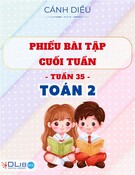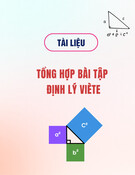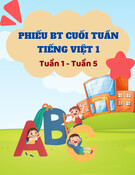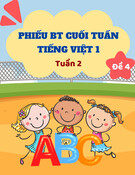
Thang Long Secondary School
REVISION FOR THE FIRST SEMESTER – GRADE 8
(School year 2019-2020)
Revision contents: From Unit 1 to Unit 5
I. Language focus
1) Grammar.
a. Tenses: all the tenses learnt before (active and passive forms): Present Simple, Present
Continuous, Present Perfect, Past Simple, Future Simple
b. Verbs structures, sentence structures and others
- Verbs of liking + gerunds
- Verbs of liking + to infinitives.
- Comparative and superlative forms of adjectives and adverbs
- Question words
- Articles: a, an, the
- Modals: should, have to, must
- Simple sentences, compound / complex sentences
2) Phonetics:
-Clusters: /br/ /pr/ /bl/ /cl/ /sk/ /sp/ /st/ /spr/ /str/ .
-Stress of vocabulary belonging to unit 1 - 5 / stress of words ending in –ion and -ian.
3) Vocabulary: Active nouns, verbs, adjectives, adverbs belonging to the topics of unit 1 -
5
II. Topics for writing, reading and listening:
1. Leisure activities
2. Life in the countryside
3. Peoples of Vietnam
4. Our customs and traditions
5. Festivals in Vietnam
III. Topics for speaking:
A. Prepared topics:
1) Talk about your favourite leisure activity.
What is your favourite leisure activity?
How / When / How often do you do it?
What benefits does it bring to you?
Does it have any negative effects? What?
What should you do to minimize its negative effects?
(If it is a non-negative-effect activity, what should you do to spread it out in your
class?)
2) Talk about a custom / a tradition of your family
What is the custom / tradition?
How long have you followed that custom / tradition?
When / How often / How do the members of your family follow that tradition?

Is it beloved by your family members?
What do you think about the future of this custom / tradition?
B. Free talk:
Answer the examiner’s questions or describe a picture given by the examiner.
PRACTICE
I. Choose the word that is stressed differently from that of the other words.
1. A. alternate B. entertain C. symbolize D. cultivate
2. A. donation B. depression C. coordination D. erection
3. A. mathematician B. technician C. consumption D. explosion
4. A. historian B. musician C. vegetarian D. magician
5. A. harmful B. cloudy C. slowly D. unique
6. A. consideration B. composition C. conversation D. concentration
7. A. museum B. decorate C. heritage D. blackberry
8. A. enjoy B. behave C. belong D. worship
9. A. location B. foundation C. organization D. performance
10. A. Indonesian B. Brazilian C. librarian D. physician
II. Choose the word whose underlined part is pronounced differently from that of the others
1. A. enough B. laugh C. paragraph D. although
2. A. novel B. princess C. cinema D. comedy
3. A. celebrate B. eight C. leisure D. penalty
4. A. surf B. cut C. fun D. sun
5. A. cake B. bracelet C. hat D. lady
III. Choose the best answer to fill in the blank.
1. According to ______, Vietnamese children often receive lucky money at Tet.
A. tradition B. traditions C. the tradition D. the traditions
2. The Vietnamese are influenced by Buddhist theology and Confucian philosophy,
________ they believe in fate in marriage.
A. so B. but C. yet D. and
3. The Xoe dance is a spiritual ________ of Thai ethnic people.
A. habit B. tradition C. custom D. dance
4. In Viet Nam you shouldn't use only the first name to _______ people older than you.
A. say B. speak C. talk D. address
5. Don't worry. It is _______ to travel to that village even at night.
A. inconvenient B. safe C. unsafe D. difficult
6. Mai studies Maths a little bit ________ .
A. bad B. badly C. hardly D. good
7. _______ month is the Hoa Ban Festival of the Thai people held in?
A. How many B. How often C. Which D. When
8. The five-fruit tray on the altar symbolizes the gratitude of the Vietnamese to their
ancestors; ________ ,it demonstrates their hope for a life of plenty.
A. moreover B. therefore C. however D. and
9. The Viet people have many _______ customs and crafts.
A. traditional B. customary C. tradition D. culture

10. Does she fancy ________ a book to the younger children?
A. reading B. to read C. read D. reads
11. ________ the Chinese greet other people, they have the custom of bowling, folding
their hands on chest.
A. Because B. Although C. When D. However
12. In Australia, you shouldn't _________ on a person's accent.
A. dislike B. criticize C. hate D. comment
13. In Viet Nam, the ________ we mostly use is chopsticks.
A. cutlery B. cut C. cutlet D. cutting
14. They enjoy ________ on Sundays.
A. gardens B. garden C. gardened D. gardening
15. ________ the first footer has a good reputation and success, the family believes that
they will receive luck and good fortune throughout the new year.
A. Moreover B. Because C. While D. If
16. Teenagers enjoy _______ to music and _______ out with friends.
A. to listen - to hang B. listen - hang C. listening - hanging D. listening - hang
17. The yellow apricot blossoms are often seen in southern Viet Nam, ________ the pink
peach blossoms are known as the primary flower in every home in the North.
A. moreover B. however C. therefore D. yet
18. The boys often help their parents to _______ water from the village well.
A. find B. gather C. collect D. give
19. The _______ on display in Da Nang Museum of Cham Sculpture are very interesting.
A. shows B. items C. products D. goods
20. During the Buddhist Festival, visitors join the procession and make offerings to
_____ Buddha at the pagoda.
A. consider B. worship C. believe D. think about
21. Always take your shoes off before you enter a temple in India, ________ you will be
considered impolite.
A. otherwise B. however C. therefore D. moreover
22. Parents usually buy new clothes and shoes for their children a month before the New
Year; ________ ,children cannot wear their new clothes until the first day of the New
Year and onward.
A. otherwise B. although C. however D. moreover
23. The left hand is customarily used for cleaning; ________, Indian people never eat
with their left hands.
A. therefore B. but C. however D. and
24. Do you know the _________ way to welcome people in Tibet?
A. custom B. customary C. customer D. tradition
25. There are no high buildings to block ________ in our village.
A. view B. the view C. a view D. some view
26. I think the Kate Festival is a really joyful festival which ________ many activities.
A. features B. contains C. includes in D. holds
27. ________ does Hoa Ban Festival take place? - In Lai Chau.
A. How B. What C. Where D. When
28. We have to ______ our shoes when we go inside a pagoda.
A. put on B. give off C. take off D. turn off
29. It is typical of the cultural life of ________ Thai people.
A. the B. X C. some D. a
30. ________ is the festival celebrate? - Every year.
A. What B. How often C. How D. When

31. We are going to prepare _______ sticky rice served with grilled chicken for the
celebration.
A. five-colours B. five-coloured C. five-colour D. five colours
32. The crops ________ on the weather.
A. depend heavily B. affect heavily C. affect heavy D. depend heavy
33. A tradition is something special that is ________ through the generations.
A. passed down B. passed out C. passed D. passed to
34. The Hung King Temple Festival ________ from the 8th to the 11th day of the third
lunar month in Phu Tho.
A. takes turn B. takes place C. takes up D. takes part
35. They love ________ with their friends.
A. having eaten B. eat out C. to eat out D. ate out
36. The Gong Festival is held ________ in the Central Highlands.
A. annual B. one a year C. annually D. year
37. ________different regions and religions have a variety in marital arrangements, the
arranged marriage is a traditional feature in every community.
A. While B. Although C. Because D. When
38. You shouldn't ________ your promise to the children.
A. keep B. break C. save D. cut
39. They detest ________ so early in the morning.
A. gets up B. to get up C. getting up D. get up
40. ________ the Vietnamese believe in fate in marriage, they also think that marriage
arrangement plays some role in activating a positive or negative fate.
A. Yet B. Even though C. However D. Therefore
41. I prefer ________ people.
A. text B. texted C. texting D. texts
42. My dad doesn't mind ________ up my mom from work every day.
A. picks B. picking C. pick D. to pick
43. _______ should children do yoga too?
A. Who B. Why C. How D. What
44. The extended family arranged marriage, ________ individuals were consulted on the
choice of their mate.
A. yet B. and C. so D. otherwise
45. During the festival, they fly many ________ kites in different shapes and sizes.
A. colouring B. colourless C. colourful D. colour
46. An old woman was ________ the goats up the mountainside.
A. talking B. riding C. herding D. running
47. ________ do the cattle provide for the nomads? - Dairy products, meat, and clothing.
A. What B. Where C. How D. Why
48. Life in a small town is _______ than that in a big city.
A. much peaceful B. peaceful C. less peaceful D. much more
peaceful
49. Yoga helps us learn _______ to co-ordinate breathing and movement.
A. why B. when C. what D. how
50. In the Central Highlands, the biggest and tallest house in the village is the _______
house.
A. commune B. community C. communication D. communal
51. “Giao Thua” is the most sacred time of the year; ________ ,the first houseguest to
offer the first greeting is very important.
A. nevertheless B. and C. moreover D. therefore

52. ________ children have performed a certain greeting before receiving lucky money,
adults return good advice, encouraging children to keep up with the schoolwork, and
obeying their parents.
A. Although B. However C. If D. When
IV. Supply the correct form of the verbs in the brackets to complete the sentences
1. My brother likes (cook)________, but he detest (do)________ the dishes.
2. Hoa, do you fancy (play)________ badminton with me sometime next week.
3. She doesn't like (communicate)________ through e-mails. In fact, she hates (do)________ it. She
prefer (meet)________ people in person.
4. They adore (make)________ and (eat)________ good food.
5. They enjoyed (watch)________ the show very much.
6. I love (listen) _____ to music with good earphones!
7. How many times you (be) to Ho Chi Minh City so far? Twice. The last time (be) two years ago
8. You ever (hear) about this writer? No. This is the first time.
9. The last time I (write) to him (be) months ago.
10. How often you (go) swimming last summer?
V. Give the correct form of the words given in bold to complete the sentences.
1. Encouraging children to eat and drink ________ is very important. (health)
2. Local people in the village often dress __________________ during the festival. (tradition)
3. Some regions in the Central Highlands in Viet Nam are not _______________ . (populate)
4. During her stay in the village, she was _______________ to the local farmers. (friend)
5. The Muong call their _____________ calendar “Sach doi”, which is made from 12 bamboo
sticks that represent the 12 months, (tradition)
6. It is very _________________ for people in remote areas to get to hospitals. (convenience)
7. It is said that water collected from the local streams is _____________ to drink. (safe)
8. There is a __________________ of books on the shelf. (collect)
9. Having to wait for ten minutes was a minor _____________________ . (convenient)
10. All of us can realize the ________ atmosphere in the countryside life. (peace)
11. My brother has been a stamp ________ for several years. (collect)
12. He spoke ________________ about the life in the countryside in Viet Nam. (optimistic)
13. For the Muong, rice is also the main ___________________ crop. (agriculture)
14. Some of the __________________ have lived here all their lives. (village)
15. I am watching a documentary about ____________ life on the Gobi highlands ( nomad)
VI. Complete these sentences using the comparatives or superlatives. Change the words given
in bold into adjectives or adverbs if necessary.
1. A lot of people feel ________ to live in the country than in the city. (happy)
2. The hall was lighted _____________ than the corridors. (bright)
3. This task can be completed _________________ than that one. (easy)
4. They boys were playing the game ________________________ than the girls. (noisy)
5. Time goes by __________________ when we are busy. (quick)
6. The Mekong River is __________________ the Red River. (long)
7. The countryside is _______________________ the town. (peace)
8. My sister is ____________ me. (tall)
9. I will have to try a bit ______________ than this. (hard)
10. Tea is ________________ for our heath than coffee. (good)
11. The film about my village town is _____________________ than the book. (interest)



![Tài liệu tham khảo Tiếng Anh lớp 8 [mới nhất/hay nhất/chuẩn nhất]](https://cdn.tailieu.vn/images/document/thumbnail/2025/20250806/anhvan.knndl.htc@gmail.com/135x160/54311754535084.jpg)










![Phiếu bài tập cuối tuần Tiếng Việt 1 tuần 2 đề 2: [Hướng dẫn chi tiết]](https://cdn.tailieu.vn/images/document/thumbnail/2025/20250728/thanhha01/135x160/42951755577464.jpg)

